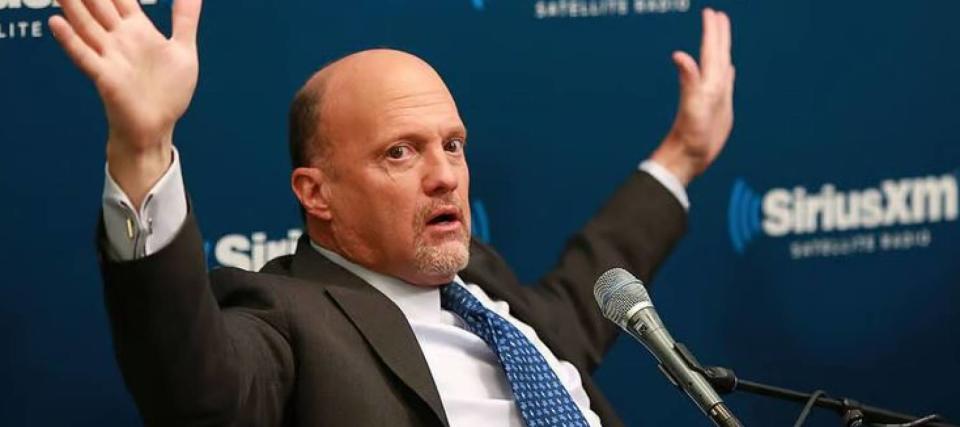Jim Cramer just predicted that an ‘economic wave’ will soon hit the US — and it will be 'fantastic for investors.' But is that a good sign or a bad sign for the stock market?

Jim Cramer, the host of CNBC's "Mad Money," is no stranger to bold claims. In fact, his energetic and boisterous style is a key part of his long-running TV show.
Now, the notorious stock picker has made another bold and controversial claim: "An economic wave is about to hit that will be fantastic for investors," he says in a recent column on CNBC's Investing Club.
Don't miss
Rich young Americans have lost confidence in the stock market — and are betting on these 3 assets instead. Get in now for strong long-term tailwinds
Here's how much money the average middle-class American household makes — how do you stack up?
This janitor in Vermont built an $8M fortune without anyone around him knowing. Here are the 2 simple techniques that made Ronald Read rich — and can do the same for you
Given his recent performance, retail investors are rightfully wondering if this is a good or bad sign for what lies ahead. Here’s a closer look.
Cramer’s optimism
Inflation is the focal point of Jim Cramer’s latest prediction. He believes the April Consumer Price Index, which came in at 4.9%, could be misleading. “Almost every calculation is incorrect. The data is wrong.”
Instead, he believes the numbers should be lower and are “actually very positive for the Fed.”
If inflation is slowing down faster than anticipated, the Fed may no longer need to raise interest rates. In fact, some analysts are now bracing for interest rate cuts. That could be the underlying thesis for bullish investors.
However, Cramer’s recent track record with bold predictions should probably give the bulls some pause.
Inverse Cramer
One of Cramer’s boldest predictions was also his worst one. “Bear Stearns is fine,” he said in March 2008, just a week before the banking giant collapsed.
That hasn’t discouraged the television star. Since Bear Stearns, Jim Cramer has made so many wrong predictions that it has inspired several memes including the “Inverse Cramer” account on Twitter and the “Cramer Curse” post on Reddit. There’s also an Inverse Cramer Tracker ETF under the ticker SJIM.
Read more: Boomer's remorse: Here are the top 5 ‘big money’ purchases you’ll (probably) regret in retirement and how to prepare for them
This is why investors are taking his latest prediction with a grain of salt.
From mad money to smart money
Instead of Mad Money, retail investors might want to consider looking to the “smart” money for economic forecasts.
Warren Buffett, arguably the most famous investor in the world, wasn’t as optimistic as Cramer in his recent public appearance. Berkshire Hathaway’s fourth-quarter report revealed that the Oracle of Omaha was a net seller of equities and was shoring up cash.
“The majority of our businesses will report lower earnings this year than last year,” Buffett told investors. The “incredible period” for the U.S. economy has been coming to an end according to him.
Buffett isn’t the only one who’s worried.
Morgan Stanley’s Chief U.S. Equity Strategist Mike Wilson is concerned about volatility emanating from the U.S. debt ceiling debate. Billionaire Stanley Druckenmiller is worried about a “hard landing” and Canadian economist David Rosenberg sees a rapid decline in earnings in the second half of the year.
The smart money seems to be collectively pessimistic about earnings, government debt, and growth. That should make some investors cautious but not discouraged.
Regardless of the economic outlook or meme-worthy indicators, having a unique perspective on investment opportunities is good to have in investing. There are opportunities to make money even in the harshest economic conditions. This is probably why famous hedge fund managers like Michael Burry and David Tepper are loading up on stocks in specific niche sectors, despite the gloomy outlook.
What to read next
UBS says 61% of millionaire collectors allocate up to 30% of their overall portfolio to this exclusive asset class
You could be the landlord of Walmart, Whole Foods and CVS (and collect fat grocery store-anchored income on a quarterly basis)
'Hold onto your money': Jeff Bezos says you might want to rethink buying a 'new automobile, refrigerator, or whatever' — here are 3 better recession-proof buys
This article provides information only and should not be construed as advice. It is provided without warranty of any kind.

 Yahoo Finance
Yahoo Finance